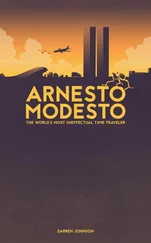James Gleick - Time Travel
Здесь есть возможность читать онлайн «James Gleick - Time Travel» — ознакомительный отрывок электронной книги совершенно бесплатно, а после прочтения отрывка купить полную версию. В некоторых случаях можно слушать аудио, скачать через торрент в формате fb2 и присутствует краткое содержание. Год выпуска: 2016, Издательство: Knopf Doubleday Publishing Group, Жанр: Старинная литература, на английском языке. Описание произведения, (предисловие) а так же отзывы посетителей доступны на портале библиотеки ЛибКат.
- Название:Time Travel
- Автор:
- Издательство:Knopf Doubleday Publishing Group
- Жанр:
- Год:2016
- ISBN:нет данных
- Рейтинг книги:5 / 5. Голосов: 1
-
Избранное:Добавить в избранное
- Отзывы:
-
Ваша оценка:
- 100
- 1
- 2
- 3
- 4
- 5
Time Travel: краткое содержание, описание и аннотация
Предлагаем к чтению аннотацию, описание, краткое содержание или предисловие (зависит от того, что написал сам автор книги «Time Travel»). Если вы не нашли необходимую информацию о книге — напишите в комментариях, мы постараемся отыскать её.
Time Travel — читать онлайн ознакомительный отрывок
Ниже представлен текст книги, разбитый по страницам. Система сохранения места последней прочитанной страницы, позволяет с удобством читать онлайн бесплатно книгу «Time Travel», без необходимости каждый раз заново искать на чём Вы остановились. Поставьте закладку, и сможете в любой момент перейти на страницу, на которой закончили чтение.
Интервал:
Закладка:
“The Primitives gave virtually no thought to Time-travel, Computer.”
“Did not consider it possible, eh?”
Just imagine—people with no concept of time travel! Primitives indeed. The rare exceptions came in the form of “speculations,” not by serious thinkers or artists, but only “in some types of escape literature,” Harlan explains. “I am not well acquainted with these, but I believe a recurrent theme was that of the man who returned in Time to kill his own grandfather as a child.” Yes, that again.
The Eternals know all about the paradoxes. They have a saying: “There are no paradoxes in Time, but only because Time deliberately avoids paradoxes.” That grandfather problem arises when you are naïve enough to assume “an indeviant reality” and try to add time travel as an afterthought. “Now your primitives,” says the Computer, “never assumed anything but an indeviant Reality. Am I right?”
Harlan is not so sure. The escapist literature again. “I don’t know enough to answer you with certainty, sir. I believe there may have been speculations as to alternate paths of time or planes of existence.”
Bah, says the Computer. That’s impossible. “No, without actual experience of Time-travel, the philosophic intricacies of Reality would be quite beyond the human mind.”
He has a point. But he underestimates us primitives. We have acquired a rich experience of time travel—a century’s worth. Time travel opens our eyes.
—
MAYBE ASIMOV BEGAN writing this tale optimistically, imagining that a fraternity of wise overseers could nudge humanity onto a better path here and there and steer us away from the nuclear peril that was on everyone’s mind in the 1950s. Like Wells, he was a rationalist, a reader of history and believer in social progress. He seems to share the satisfaction his hero, the Technician Harlan, feels in “a universe where Reality was something flexible and evanescent, something men such as himself could hold in the palms of their hands and shake into better shape.” If so, Asimov couldn’t sustain his optimism. The story takes a dark turn. We begin to see these Eternals not just as philistines but as monsters.
There is a woman after all. Much as Wells’s Time Traveller had his girl-of-the-future Weena, Harlan finds Noÿs, “the girl of the 482nd.” (“It was not that Harlan had never seen a girl in Eternity before. Never was too strong a word. Rarely, yes…But a girl such as this !”) She has glossy hair, “gluteal curves,” milky white skin, and some tinkling jewels that draw attention to her “graceful breasts.” She has been assigned to Eternity as a sort of temp for secretarial work. Apparently she is not too bright. Harlan finds he has to explain to her some of the simplest concepts of time. She, in turn, manages to educate him about sex, about which he is naïve, being a stereotype himself.
For a while Noÿs serves as a minor plot device, the motive for some jostling and maneuvering among the Eternals. Harlan, besotted, goes rogue and hustles her into the kettle. They zoom off together. “We’re going upwhen, Noÿs.” “That means the future, doesn’t it?” He stashes her in one of the literature’s odder love nests, a spare room in an empty corridor of the year 111,394, where he passes the time with a great deal more explaining. He has to explain Reality Changes, he has to explain Computers, he has to explain “physiotime” as opposed to real time. She listens eagerly. “I don’t think I’ll ever understand it all,” sighs Noÿs, her eyes sparkling with “frank admiration.”
Eventually he explains his intention to take her with him back in time to before the creation of Eternity—to the Primitive era, where they will find themselves in a sparsely populated southwestern territory of the United States of America. “A craggy, lonely world brightened by the splendor of an afternoon sun. There was a soft wind with a chilly edge to it and, most of all, silence…bare rocks…colored into dull rainbows…manless and all but lifeless surroundings.”
Harlan thinks he is on a mission to protect Eternity: to close a circle, to ensure its creation. He has a surprise coming: Noÿs is on a mission of her own. She is no Weena. She is an operative sent from a future beyond the imagining even of the Eternals—from a time they have not managed to penetrate, the so-called Hidden Centuries.
It’s Noÿs’s turn to explain. Her people, the people of the Hidden Centuries, see human history whole, and more than that, as a tapestry of combined possibilities. They see alternative realities as if they were real: “A kind of ghostly never-never land where the might-have-beens play with the ifs.” As for Harlan’s revered Eternals, she points out that these meddlers are nothing more than a bunch of psychopaths.
“Psychopaths!” exploded Harlan.
“Aren’t they? You know them. Think!”
Their incessant petty tinkering has ruined everything, according to the wise future people of the Hidden Centuries. They have “bred out the unusual.” In forestalling disasters, they have left no room for triumphs that come only from danger and insecurity. In particular, the Eternals have adamantly prevented the development of nuclear weaponry, at the cost of forestalling any possibility of interstellar travel.
So Noÿs is the time traveler on a mission to change history and Harlan her unwitting pawn. She has brought them on a one-way trip to Primitive times in order to effect the reality change to end all reality changes. She will allow humanity to create its first nuclear explosion at the “19.45th” century, and she will forestall the establishment of Eternity.
Happy ending for Technician Harlan, though: although Noÿs is not the ingenue she has pretended to be, she truly loves him. They will live happily ever after, and “have children and grandchildren, and mankind will remain to reach the stars.” We are left with just the one puzzle, then: why the superwoman from the Hidden Centuries, having accomplished her mission of placing humanity on a path to interstellar greatness, wants to settle down with the hapless Andrew Harlan.
So much for eternity. It was a sacred concept: a state of grace, outside of time. For a few hundred pages Asimov turns it into a mere place —outside of “Time,” but equipped with elevator shafts and storerooms, a uniformed support staff, new men arriving by invitation only. That is quite a comedown. For the godless, though, what else is there? Who has this power over time? The devil.
With us acts are exempt from time, and we
Can crowd eternity into an hour,
Or stretch an hour into eternity.
That’s Lucifer, per Lord Byron, on good authority. Luke 4:5: “And the devil, taking him up into an high mountain, showed unto him all the kingdoms of the world in a moment of time.” Kurt Vonnegut must have remembered this when he created his Tralfamadorians, adorable green aliens who experience reality in four dimensions: “All moments, past, present and future, always have existed, always will exist. The Tralfamadorians can look at all the different moments just that way we can look at a stretch of the Rocky Mountains, for instance.” Eternity is not for us. We may aspire to it, we may imagine it, but we cannot have it.
If we’re going to speak literally, nothing is outside of time. Asimov ends his story by nullifying it. Who has the privilege of changing history? Not the Technicians, only the author. On the last page the entire previous narrative—the people we have met, the stories we have watched unfold—is erased with the stroke of a pen. The rewriters of history are written out.
*1 “Harlan had seen many women in his passages through Time, but in Time they were only objects to him, like walls and balls, barrows and harrows, kittens and mittens.”
Читать дальшеИнтервал:
Закладка:
Похожие книги на «Time Travel»
Представляем Вашему вниманию похожие книги на «Time Travel» списком для выбора. Мы отобрали схожую по названию и смыслу литературу в надежде предоставить читателям больше вариантов отыскать новые, интересные, ещё непрочитанные произведения.
Обсуждение, отзывы о книге «Time Travel» и просто собственные мнения читателей. Оставьте ваши комментарии, напишите, что Вы думаете о произведении, его смысле или главных героях. Укажите что конкретно понравилось, а что нет, и почему Вы так считаете.












